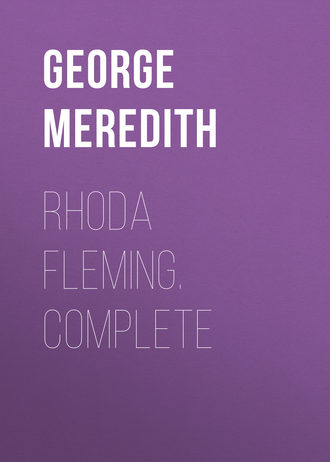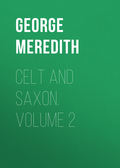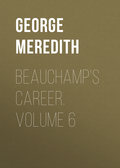
George Meredith
Rhoda Fleming. Complete
She turned a face of ashes upon Robert.
“Come away, father. She is our own. She is my sister. A doubt of her is an insult to us.”
“But Robert don’t doubt her—eh?” The farmer was already half distracted from his suspicions. “Have you any real doubt about the girl, Robert?”
“I don’t trust myself to doubt anybody,” said Robert.
“You don’t cast us off, my boy?”
“I’m a labourer on the farm,” said Robert, and walked away.
“He’s got reason to feel this more ‘n the rest of us, poor lad! It’s a blow to him.” With which the farmer struck his hand on Rhoda’s shoulder.
“I wish he’d set his heart on a safer young woman.”
Rhoda’s shudder of revulsion was visible as she put her mouth up to kiss her father’s cheek.
CHAPTER VIII
That is Wrexby Hall, upon the hill between Fenhurst and Wrexby: the white square mansion, with the lower drawing-room windows one full bow of glass against the sunlight, and great single trees spotting the distant green slopes. From Queen Anne’s Farm you could read the hour by the stretching of their shadows. Squire Blancove, who lived there, was an irascible, gouty man, out of humour with his time, and beginning, alas for him! to lose all true faith in his Port, though, to do him justice, he wrestled hard with this great heresy. His friends perceived the decay in his belief sooner than he did himself. He was sour in the evening as in the morning. There was no chirp in him when the bottle went round. He had never one hour of a humane mood to be reckoned on now. The day, indeed, is sad when we see the skeleton of the mistress by whom we suffer, but cannot abandon her. The squire drank, knowing that the issue would be the terrific, curse-begetting twinge in his foot; but, as he said, he was a man who stuck to his habits. It was over his Port that he had quarrelled with his rector on the subject of hopeful Algernon, and the system he adopted with that young man. This incident has something to do with Rhoda’s story, for it was the reason why Mrs. Lovell went to Wrexby Church, the spirit of that lady leading her to follow her own impulses, which were mostly in opposition. So, when perchance she visited the Hall, she chose not to accompany the squire and his subservient guests to Fenhurst, but made a point of going down to the unoccupied Wrexby pew. She was a beauty, and therefore powerful; otherwise her act of nonconformity would have produced bad blood between her and the squire.
It was enough to have done so in any case; for now, instead of sitting at home comfortably, and reading off the week’s chronicle of sport while he nursed his leg, the unfortunate gentleman had to be up and away to Fenhurst every Sunday morning, or who would have known that the old cause of his general abstention from Sabbath services lay in the detestable doctrine of Wrexby’s rector?
Mrs. Lovell was now at the Hall, and it was Sunday morning after breakfast. The lady stood like a rival head among the other guests, listening, gloved and bonneted, to the bells of Wrexby, West of the hills, and of Fenhurst, Northeast. The squire came in to them, groaning over his boots, cross with his fragile wife, and in every mood for satire, except to receive it.
“How difficult it is to be gouty and good!” murmured Mrs. Lovell to the person next her.
“Well,” said the squire, singling out his enemy, “you’re going to that fellow, I suppose, as usual—eh?”
“Not ‘as usual,’” replied Mrs. Lovell, sweetly; “I wish it were!”
“Wish it were, do you?—you find him so entertaining? Has he got to talking of the fashions?”
“He talks properly; I don’t ask for more.” Mrs. Lovell assumed an air of meekness under persecution.
“I thought you were Low Church.”
“Lowly of the Church, I trust you thought,” she corrected him. “But, for that matter, any discourse, plainly delivered, will suit me.”
“His elocution’s perfect,” said the squire; “that is, before dinner.”
“I have only to do with him before dinner, you know.”
“Well, I’ve ordered a carriage out for you.”
“That is very honourable and kind.”
“It would be kinder if I contrived to keep you away from the fellow.”
“Would it not be kinder to yourself,” Mrs. Lovell swam forward to him in all tenderness, taking his hands, and fixing the swimming blue of her soft eyes upon him pathetically, “if you took your paper and your slippers, and awaited our return?”
The squire felt the circulating smile about the room. He rebuked the woman’s audacity with a frown; “Tis my duty to set an example,” he said, his gouty foot and irritable temper now meeting in a common fire.
“Since you are setting an example,” rejoined the exquisite widow, “I have nothing more to say.”
The squire looked what he dared not speak. A woman has half, a beauty has all, the world with her when she is self-contained, and holds her place; and it was evident that Mrs. Lovell was not one to abandon her advantages.
He snapped round for a victim, trying his wife first. Then his eyes rested upon Algernon.
“Well, here we are; which of us will you take?” he asked Mrs. Lovell in blank irony.
“I have engaged my cavalier, who is waiting, and will be as devout as possible.” Mrs. Lovell gave Algernon a smile.
“I thought I hit upon the man,” growled the squire. “You’re going in to Wrexby, sir! Oh, go, by all means, and I shan’t be astonished at what comes of it. Like teacher, like pupil!”
“There!” Mrs. Lovell gave Algernon another smile. “You have to bear the sins of your rector, as well as your own. Can you support it?”
The flimsy fine dialogue was a little above Algernon’s level in the society of ladies; but he muttered, bowing, that he would endeavour to support it, with Mrs. Lovell’s help, and this did well enough; after which, the slight strain on the intellects of the assemblage relaxed, and ordinary topics were discussed. The carriages came round to the door; gloves, parasols, and scent-bottles were securely grasped; whereupon the squire, standing bare-headed on the steps, insisted upon seeing the party of the opposition off first, and waited to hand Mrs. Lovell into her carriage, an ironic gallantry accepted by the lady with serenity befitting the sacred hour.
“Ah! my pencil, to mark the text for you, squire,” she said, taking her seat; and Algernon turned back at her bidding, to get a pencil; and she, presenting a most harmonious aspect in the lovely landscape, reclined in the carriage as if, like the sweet summer air, she too were quieted by those holy bells, while the squire stood, fuming, bareheaded, and with boiling blood, just within the bounds of decorum on the steps. She was more than his match.
She was more than a match for most; and it was not a secret. Algernon knew it as well as Edward, or any one. She was a terror to the soul of the youth, and an attraction. Her smile was the richest flattery he could feel; the richer, perhaps, from his feeling it to be a thing impossible to fix. He had heard tales of her; he remembered Edward’s warning; but he was very humbly sitting with her now, and very happy.
“I’m in for it,” he said to his fair companion; “no cheque for me next quarter, and no chance of an increase. He’ll tell me I’ve got a salary. A salary! Good Lord! what a man comes to! I’ve done for myself with the squire for a year.”
“You must think whether you have compensation,” said the lady, and he received it in a cousinly squeeze of his hand.
He was about to raise the lank white hand to his lips.
“Ah!” she said, “there would be no compensation to me, if that were seen;” and her dainty hand was withdrawn. “Now, tell me,” she changed her tone. “How do the loves prosper?”
Algernon begged her not to call them ‘loves.’ She nodded and smiled.
“Your artistic admirations,” she observed. “I am to see her in church, am I not? Only, my dear Algy, don’t go too far. Rustic beauties are as dangerous as Court Princesses. Where was it you saw her first?”
“At the Bank,” said Algernon.
“Really! at the Bank! So your time there is not absolutely wasted. What brought her to London, I wonder?”
“Well, she has an old uncle, a queer old fellow, and he’s a sort of porter—money porter—in the Bank, awfully honest, or he might half break it some fine day, if he chose to cut and run. She’s got a sister, prettier than this girl, the fellows say; I’ve never seen her. I expect I’ve seen a portrait of her, though.”
“Ah!” Mrs. Lovell musically drew him on. “Was she dark, too?”
“No, she’s fair. At least, she is in her portrait.”
“Brown hair; hazel eyes?”
“Oh—oh! You guess, do you?”
“I guess nothing, though it seems profitable. That Yankee betting man ‘guesses,’ and what heaps of money he makes by it!”
“I wish I did,” Algernon sighed. “All my guessing and reckoning goes wrong. I’m safe for next Spring, that’s one comfort. I shall make twenty thousand next Spring.”
“On Templemore?”
“That’s the horse. I’ve got a little on Tenpenny Nail as well. But I’m quite safe on Templemore; unless the Evil Principle comes into the field.”
“Is he so sure to be against you, if he does appear?” said Mrs. Lovell.
“Certain!” ejaculated Algernon, in honest indignation.
“Well, Algy, I don’t like to have him on my side. Perhaps I will take a share in your luck, to make it—? to make it?”—She played prettily as a mistress teasing her lap-dog to jump for a morsel; adding: “Oh! Algy, you are not a Frenchman. To make it divine, sir! you have missed your chance.”
“There’s one chance I shouldn’t like to miss,” said the youth.
“Then, do not mention it,” she counselled him. “And, seriously, I will take a part of your risk. I fear I am lucky, which is ruinous. We will settle that, by-and-by. Do you know, Algy, the most expensive position in the world is a widow’s.”
“You needn’t be one very long,” growled he.
“I’m so wretchedly fastidious, don’t you see? And it’s best not to sigh when we’re talking of business, if you’ll take me for a guide. So, the old man brought this pretty rustic Miss Rhoda to the Bank?”
“Once,” said Algernon. “Just as he did with her sister. He’s proud of his nieces; shows them and then hides them. The fellows at the Bank never saw her again.”
“Her name is—?”
“Dahlia.”
“Ah, yes!—Dahlia. Extremely pretty. There are brown dahlias—dahlias of all colours. And the portrait of this fair creature hangs up in your chambers in town?”
“Don’t call them my chambers,” Algernon protested.
“Your cousin’s, if you like. Probably Edward happened to be at the Bank when fair Dahlia paid her visit. Once seems to have been enough for both of you.”
Algernon was unread in the hearts of women, and imagined that Edward’s defection from Mrs. Lovell’s sway had deprived him of the lady’s sympathy and interest in his fortunes.
“Poor old Ned’s in some scrape, I think,” he said.
“Where is he?” the lady asked, languidly.
“Paris.”
“Paris? How very odd! And out of the season, in this hot weather. It’s enough to lead me to dream that he has gone over—one cannot realize why.”
“Upon my honour!” Algernon thumped on his knee; “by jingo!” he adopted a less compromising interjection; “Ned’s fool enough. My idea is, he’s gone and got married.”
Mrs. Lovell was lying back with the neglectful grace of incontestable beauty; not a line to wrinkle her smooth soft features. For one sharp instant her face was all edged and puckered, like the face of a fair witch. She sat upright.
“Married! But how can that be when we none of us have heard a word of it?”
“I daresay you haven’t,” said Algernon; “and not likely to. Ned’s the closest fellow of my acquaintance. He hasn’t taken me into his confidence, you maybe sure; he knows I’m too leaky. There’s no bore like a secret! I’ve come to my conclusion in this affair by putting together a lot of little incidents and adding them up. First, I believe he was at the Bank when that fair girl was seen there. Secondly, from the description the fellows give of her, I should take her to be the original of the portrait. Next, I know that Rhoda has a fair sister who has run for it. And last, Rhoda has had a letter from her sister, to say she’s away to the Continent and is married. Ned’s in Paris. Those are my facts, and I give you my reckoning of them.”
Mrs. Lovell gazed at Algernon for one long meditative moment.
“Impossible,” she exclaimed. “Edward has more brains than heart.” And now the lady’s face was scarlet. “How did this Rhoda, with her absurd name, think of meeting you to tell you such stuff? Indeed, there’s a simplicity in some of these young women—” She said the remainder to herself.
“She’s really very innocent and good,” Algernon defended Rhoda, “she is. There isn’t a particle of nonsense in her. I first met her in town, as I stated, at the Bank; just on the steps, and we remembered I had called a cab for her a little before; and I met her again by accident yesterday.”
“You are only a boy in their hands, my cousin Algy!” said Mrs. Lovell.
Algernon nodded with a self-defensive knowingness. “I fancy there’s no doubt her sister has written to her that she’s married. It’s certain she has. She’s a blunt sort of girl; not one to lie, not even for a sister or a lover, unless she had previously made up her mind to it. In that case, she wouldn’t stick at much.”
“But, do you know,” said Mrs. Lovell—“do you know that Edward’s father would be worse than yours over such an act of folly? He would call it an offence against common sense, and have no mercy for it. He would be vindictive on principle. This story of yours cannot be true. Nothing reconciles it.”
“Oh, Sir Billy will be rusty; that stands to reason,” Algernon assented. “It mayn’t be true. I hope it isn’t. But Ned has a madness for fair women. He’d do anything on earth for them. He loses his head entirely.”
“That he may have been imprudent—” Mrs. Lovell thus blushingly hinted at the lesser sin of his deceiving and ruining the girl.
“Oh, it needn’t be true,” said Algernon; and with meaning, “Who’s to blame if it is?”
Mrs. Lovell again reddened. She touched Algernon’s fingers.
“His friends mustn’t forsake him, in any case.”
“By Jove! you are the right sort of woman,” cried Algernon.
It was beyond his faculties to divine that her not forsaking of Edward might haply come to mean something disastrous to him. The touch of Mrs. Lovell’s hand made him forget Rhoda in a twinkling. He detained it, audaciously, even until she frowned with petulance and stamped her foot.
There was over her bosom a large cameo-brooch, representing a tomb under a palm-tree, and the figure of a veiled woman with her head bowed upon the tomb. This brooch was falling, when Algernon caught it. The pin tore his finger, and in the energy of pain he dashed the brooch to her feet, with immediate outcries of violent disgust at himself and exclamations for pardon. He picked up the brooch. It was open. A strange, discoloured, folded substance lay on the floor of the carriage. Mrs. Lovell gazed down at it, and then at him, ghastly pale. He lifted it by one corner, and the diminutive folded squares came out, revealing a strip of red-stained handkerchief.
Mrs. Lovell grasped it, and thrust it out of sight.
She spoke as they approached the church-door: “Mention nothing of this to a soul, or you forfeit my friendship for ever.”
When they alighted, she was smiling in her old affable manner.
CHAPTER IX
Some consideration for Robert, after all, as being the man who loved her, sufficed to give him rank as a more elevated kind of criminal in Rhoda’s sight, and exquisite torture of the highest form was administered to him. Her faith in her sister was so sure that she could half pardon him for the momentary harm he had done to Dahlia with her father; but, judging him by the lofty standard of one who craved to be her husband, she could not pardon his unmanly hesitation and manner of speech. The old and deep grievance in her heart as to what men thought of women, and as to the harshness of men, was stirred constantly by the remembrance of his irresolute looks, and his not having dared to speak nobly for Dahlia, even though he might have had, the knavery to think evil. As the case stood, there was still mischief to counteract. Her father had willingly swallowed a drug, but his suspicions only slumbered, and she could not instil her own vivid hopefulness and trust into him. Letters from Dahlia came regularly. The first, from Lausanne, favoured Rhoda’s conception of her as of a happy spirit resting at celestial stages of her ascent upward through spheres of ecstacy. Dahlia could see the snow-mountains in a flying glimpse; and again, peacefully seated, she could see the snow-mountains reflected in clear blue waters from her window, which, Rhoda thought, must be like heaven. On these inspired occasions, Robert presented the form of a malignant serpent in her ideas. Then Dahlia made excursions upon glaciers with her beloved, her helpmate, and had slippings and tumblings—little earthly casualties which gave a charming sense of reality to her otherwise miraculous flight. The Alps were crossed: Italy was beheld. A profusion of “Oh’s!” described Dahlia’s impressions of Italy; and “Oh! the heat!” showed her to be mortal, notwithstanding the sublime exclamations. Como received the blissful couple. Dahlia wrote from Como:—
“Tell father that gentlemen in my Edward’s position cannot always immediately proclaim their marriage to the world. There are reasons. I hope he has been very angry with me: then it will be soon over, and we shall be—but I cannot look back. I shall not look back till we reach Venice. At Venice, I know I shall see you all as clear as day; but I cannot even remember the features of my darling here.”
Her Christian name was still her only signature.
The thin blue-and-pink paper, and the foreign postmarks—testifications to Dahlia’s journey not being a fictitious event, had a singular deliciousness for the solitary girl at the Farm. At times, as she turned them over, she was startled by the intoxication of her sentiments, for the wild thought would come, that many, many whose passionate hearts she could feel as her own, were ready to abandon principle and the bondage to the hereafter, for such a long delicious gulp of divine life. Rhoda found herself more than once brooding on the possible case that Dahlia had done this thing.
The fit of languor came on her unawares, probing at her weakness, and blinding her to the laws and duties of earth, until her conscious womanhood checked it, and she sprang from the vision in a spasm of terror, not knowing how far she had fallen.
After such personal experiences, she suffered great longings to be with her sister, that the touch of her hand, the gaze of her eyes, the tone of Dahlia’s voice, might make her sure of her sister’s safety.
Rhoda’s devotions in church were frequently distracted by the occupants of the Blancove pew. Mrs. Lovell had the habit of looking at her with an extraordinary directness, an expressionless dissecting scrutiny, that was bewildering and confusing to the country damsel. Algernon likewise bestowed marked attention on her. Some curious hints had been thrown out to her by this young gentleman on the day when he ventured to speak to her in the lane, which led her to fancy distantly that he had some acquaintance with Dahlia’s husband, or that he had heard of Dahlia.
It was clear to Rhoda that Algernon sought another interview. He appeared in the neighbourhood of the farm on Saturdays, and on Sundays he was present in the church, sometimes with Mrs. Lovell, and sometimes without a companion. His appearance sent her quick wits travelling through many scales of possible conduct: and they struck one ringing note:—she thought that by the aid of this gentleman a lesson might be given to Robert’s mean nature. It was part of Robert’s punishment to see that she was not unconscious of Algernon’s admiration.
The first letter from Venice consisted of a series of interjections in praise of the poetry of gondolas, varied by allusions to the sad smell of the low tide water, and the amazing quality of the heat; and then Dahlia wrote more composedly:—
“Titian the painter lived here, and painted ladies, who sat to him without a bit of garment on, and indeed, my darling, I often think it was more comfortable for the model than for the artist. Even modesty seems too hot a covering for human creatures here. The sun strikes me down. I am ceasing to have a complexion. It is pleasant to know that my Edward is still proud of me. He has made acquaintance with some of the officers here, and seems pleased at the compliments they pay me.
“They have nice manners, and white uniforms that fit them like a kid glove. I am Edward’s ‘resplendent wife.’ A colonel of one of the regiments invited him to dinner (speaking English), ‘with your resplendent wife.’ Edward has no mercy for errors of language, and he would not take me. Ah! who knows how strange men are! Never think of being happy unless you can always be blind. I see you all at home—Mother Dumpling and all—as I thought I should when I was to come to Venice.
“Persuade—do persuade father that everything will be well. Some persons are to be trusted. Make him feel it. I know that I am life itself to Edward. He has lived as men do, and he can judge, and he knows that there never was a wife who brought a heart to her husband like mine to him. He wants to think, or he wants to smoke, and he leaves me; but, oh! when he returns, he can scarcely believe that he has me, his joy is so great. He looks like a glad thankful child, and he has the manliest of faces. It is generally thoughtful; you might think it hard, at first sight.
“But you must be beautiful to please some men. You will laugh—I have really got the habit of talking to my face and all myself in the glass. Rhoda would think me cracked. And it is really true that I was never so humble about my good looks. You used to spoil me at home—you and that wicked old Mother Dumpling, and our own dear mother, Rhoda—oh! mother, mother! I wish I had always thought of you looking down on me! You made me so vain—much more vain than I let you see I was. There were times when it is quite true I thought myself a princess. I am not worse-looking now, but I suppose I desire to be so beautiful that nothing satisfies me.
“A spot on my neck gives me a dreadful fright. If my hair comes out much when I comb it, it sets my heart beating; and it is a daily misery to me that my hands are larger than they should be, belonging to Edward’s ‘resplendent wife.’ I thank heaven that you and I always saw the necessity of being careful of our fingernails. My feet are of moderate size, though they are not French feet, as Edward says. No: I shall never dance. He sent me to the dancing-master in London, but it was too late. But I have been complimented on my walking, and that seems to please Edward. He does not dance (or mind dancing) himself, only he does not like me to miss one perfection. It is his love. Oh! if I have seemed to let you suppose he does not love me as ever, do not think it. He is most tender and true to me. Addio! I am signora, you are signorina.
“They have such pretty manners to us over here. Edward says they think less of women: I say they think more. But I feel he must be right. Oh, my dear, cold, loving, innocent sister! put out your arms; I shall feel them round me, and kiss you, kiss you for ever!”
Onward from city to city, like a radiation of light from the old farm-house, where so little of it was, Dahlia continued her journey; and then, without a warning, with only a word to say that she neared Rome, the letters ceased. A chord snapped in Rhoda’s bosom. While she was hearing from her sister almost weekly, her confidence was buoyed on a summer sea. In the silence it fell upon a dread. She had no answer in her mind for her father’s unspoken dissatisfaction, and she had to conceal her cruel anxiety. There was an interval of two months: a blank fell charged with apprehension that was like the humming of a toneless wind before storm; worse than the storm, for any human thing to bear.
Rhoda was unaware that Robert, who rarely looked at her, and never sought to speak a word to her when by chance they met and were alone, studied each change in her face, and read its signs. He was left to his own interpretation of them, but the signs he knew accurately. He knew that her pride had sunk, and that her heart was desolate. He believed that she had discovered her sister’s misery.
One day a letter arrived that gave her no joyful colouring, though it sent colour to her cheeks. She opened it, evidently not knowing the handwriting; her eyes ran down the lines hurriedly. After a time she went upstairs for her bonnet.
At the stile leading into that lane where Robert had previously seen her, she was stopped by him.
“No farther,” was all that he said, and he was one who could have interdicted men from advancing.
“Why may I not go by you?” said Rhoda, with a woman’s affected humbleness.
Robert joined his hands. “You go no farther, Miss Rhoda, unless you take me with you.”
“I shall not do that, Mr. Robert.”
“Then you had better return home.”
“Will you let me know what reasons you have for behaving in this manner to me?”
“I’ll let you know by-and-by,” said Robert. “At present, You’ll let the stronger of the two have his way.”
He had always been so meek and gentle and inoffensive, that her contempt had enjoyed free play, and had never risen to anger; but violent anger now surged against him, and she cried, “Do you dare to touch me?” trying to force her passage by.
Robert caught her softly by the wrist. There stood at the same time a full-statured strength of will in his eyes, under which her own fainted.
“Go back,” he said; and she turned that he might not see her tears of irritation and shame. He was treating her as a child; but it was to herself alone that she could defend herself. She marvelled that when she thought of an outspoken complaint against him, her conscience gave her no support.
“Is there no freedom for a woman at all in this world?” Rhoda framed the bitter question.
Rhoda went back as she had come. Algernon Blancove did the same. Between them stood Robert, thinking, “Now I have made that girl hate me for life.”
It was in November that a letter, dated from London, reached the farm, quickening Rhoda’s blood anew. “I am alive,” said Dahlia; and she said little more, except that she was waiting to see her sister, and bade her urgently to travel up alone. Her father consented to her doing so. After a consultation with Robert, however, he determined to accompany her.
“She can’t object to see me too,” said the farmer; and Rhoda answered “No.” But her face was bronze to Robert when they took their departure.






